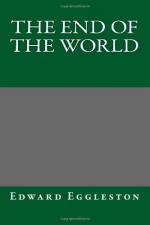In the corner next the donjon chimney was a little room with a small fireplace. Thus the hermit economized wood, for wood meant time, and time meant communion with his books. All of his domestic arrangements were carried on after this frugal fashion. In the little room was a writing-desk, covered with manuscripts and commonplace books.
“Well, my young friend, you’re thrice welcome,” said Andrew, who never dropped his book language. “What will you have? Will you resume your apprenticeship under Goethe, or shall we canter to Canterbury with Chaucer? Grand old Dan Chaucer! Or, shall we study magical philosophy with Roger Bacon—the Friar, the Admirable Doctor? or read good Sir Thomas More? What would Sir Thomas have said if he could have thought that he would be admired by two such people as you and I, in the woods of America, in the nineteenth century? But you do not want books! Ah! my brave friend, you are not well. Come into my cell and let us talk. What grieves you?”
And Andrew took him by the hand with the courtesy of a knight, with the tenderness of a woman, and with the air of an astrologer, and led him into the apartment of a monk.
[Illustration: THE SEDILIUM AT THE CASTLE.]
“See!” he said, “I have made a new chair. It is the highest evidence of my love for my Teutonic friend. You have now a right to this castle. You shall be perpetually welcome. I said to myself, German scholarship shall sit there, and the Backwoods Philosopher will sit here. So sit down on my sedilium, and let us hear how this uncivil and inconstant world treats you. It can not deal worse with you than it has with me. But I have had my revenge on it! I have been revenged! I have done as I pleased, and defied the world and all its hollow conventionalities.” These last words were spoken in a tone of misanthropic bitterness common to Andrew. His love for August was the more intense that it stood upon a background of general dislike, if not for the world, at least for that portion of it which most immediately surrounded him.




